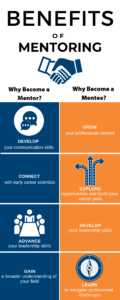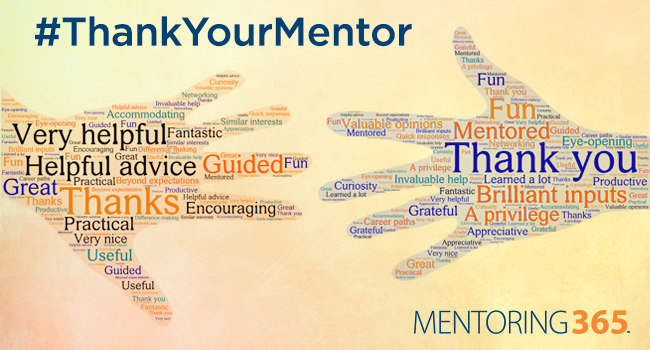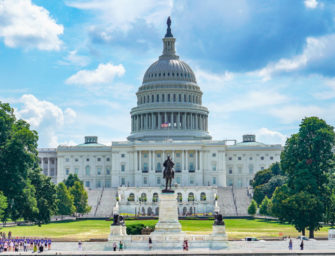Contribute to a Mentoring Program for #ThankYourMentor Day
Every year, the Honors Banquet is a highlight for me at the AGU Fall Meeting. While I am always impressed with the descriptions of the honorees’ amazing contributions to the Earth and space sciences, what I enjoy most are the heartfelt thanks that the honorees offer to those who have helped them along the way. Their sincere acknowledgements of their mentors serve as a reminder that great science is rarely achieved in isolation. My interest in mentoring over the past two decades has been driven by this recognition. I want to give everyone an equal shot at great science. I strongly believe that if our community is interested in cultivating an atmosphere that produces excellence in the Earth and space sciences, then we should be equally committed to excellence in mentoring. From my vantage point, the two go hand in hand.
 In the Earth and space science communities, access to mentors and mentoring has not always been equal. Studies have shown stark differences in access related to gender, race, and nationality. My own interest in mentoring advocacy began in the community of physical oceanography where, over a decade ago, I initiated the Mentoring Women in Physical Oceanography to Increase Retention (MPOWIR) program. From the start of that program, I considered the lack of retention of women in my field a community issue, not a women’s issue. And today, as I work on mentoring programs for AGU, that philosophy remains. I believe that all of us have a responsibility and opportunity to support the students and early-career scientists in our fields, regardless of who they are or who we are. We all want to attract and retain the best and brightest individuals in the Earth and space sciences.
In the Earth and space science communities, access to mentors and mentoring has not always been equal. Studies have shown stark differences in access related to gender, race, and nationality. My own interest in mentoring advocacy began in the community of physical oceanography where, over a decade ago, I initiated the Mentoring Women in Physical Oceanography to Increase Retention (MPOWIR) program. From the start of that program, I considered the lack of retention of women in my field a community issue, not a women’s issue. And today, as I work on mentoring programs for AGU, that philosophy remains. I believe that all of us have a responsibility and opportunity to support the students and early-career scientists in our fields, regardless of who they are or who we are. We all want to attract and retain the best and brightest individuals in the Earth and space sciences.
Fortunately, I am not alone in that sentiment. A survey last year of members of the recently assembled AGU College of Fellows revealed a strong interest in mentoring. Of all the ways that Fellows could “give back” to the AGU community, mentoring stood at the top of the list. From that conclusion, the AGU Mentoring Network was developed and then initiated in the summer of 2018. Six mentoring groups, each with two senior mentors and six early-career scientists, meet virtually once a month to address a host of issues that can be difficult to navigate in the early stages of one’s career. These groups are not bound by discipline. In my own mentoring group, the studies of near surface geophysics, land-atmosphere interactions, coastal processes, geodynamics, and geochemistry are all represented. Not surprisingly, the group has found that career roadblocks—and the mentoring that finds ways around those roadblocks—transcend disciplinary boundaries.
The same is true for Mentoring365, another AGU mentoring program that has met success by matching willing mentors across the span of AGU disciplines with students across that same span. Through mentoring, AGU is improving connections between generations of Earth and space scientists and ensuring a robust—and representative—future workforce.
I hope that you will consider contributing to an AGU mentoring program. By creating a broad and extensive mentoring network, AGU can become a community of scientists committed to excellent science and to each other.
Finally, on Thank Your Mentor Day, I would be remiss if I did not acknowledge my own mentors over these many years, and those whom I have mentored. Both groups have added immeasurably to my science, my career, and the enjoyment I have found in both. There are too many names to call out, but since I am celebrating the 30th anniversary of my graduation from the University of Washington this spring, I will thank Steve Riser, my Ph.D. advisor and my first—and funniest—mentor.




There are no comments
Add yours